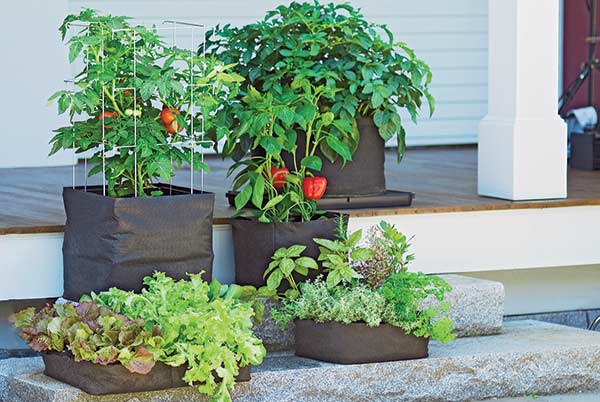
Sowing Serenity
Tips for Container Gardening
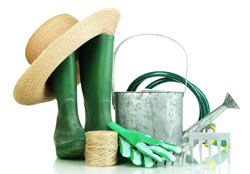 Ask anyone who has gone gluten-free and they are likely to say it was a catalyst for change in how they look at health. With the elimination of gluten, the brain fog and headaches disappeared. With the addition of daily walks, they became more energized. When well-being is viewed from a holistic perspective – where the health of body and mind go hand-in-hand – they begin to seek out not only foods that nourish, but activities that revitalize the total being as well.
Ask anyone who has gone gluten-free and they are likely to say it was a catalyst for change in how they look at health. With the elimination of gluten, the brain fog and headaches disappeared. With the addition of daily walks, they became more energized. When well-being is viewed from a holistic perspective – where the health of body and mind go hand-in-hand – they begin to seek out not only foods that nourish, but activities that revitalize the total being as well.
One such restorative activity for mind and body is gardening, a pastime that adds beauty to your world, puts wholesome food on your plate and gives a boost to your mood. And the good news is that reaping these rewards does not require an acre-sized plot of land! With a variety of containers and a few surefire tips, a sunny kitchen window, the smallest of patio spaces or a postage-stamp backyard can be transformed into a mini garden oasis – yielding more than enough lettuce, tomatoes and mental respite to last an entire season.
Containers
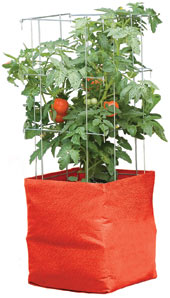
Size and drainage are the things you’ll want to keep in mind when selecting containers for growing vegetables and herbs. Larger plants such as tomatoes and eggplants generally have larger root systems and do best in five gallon or larger containers. Smaller plants like leaf lettuce may be grown in pots as small as six inches in diameter as long as care is taken to maintain soil moisture. Grow Bags (www.gardeners.com) are gaining in popularity and are a fantastic way to grow potatoes, peppers and tomatoes. For the budget-conscious container gardener, soft-sided reusable shopping bags (with drainage holes punched into the bottom) work quite well. Live in a hail-prone region? Containers on wheels that may swiftly be rolled under shelter are great crop insurance. Retrofit a child’s old wagon by drilling holes in the bottom, or go elaborate with a container on wheels from Garden365 (www.garden365.com). For drainage, err on the safe side of more is better. When soil becomes too wet, roots rot and plants die. A good rule of thumb: ensure pots have at least a ½-inch diameter hole for each gallon of soil.
Soil
Choosing the right soil for your container garden is crucial. Most plants are happiest growing in a lightweight variety that allows for quick and efficient draining. Commercial organic potting soils are a great choice or make your own mix using one part each of garden soil, peat moss, manure and sand – all of which may be found at garden centers.
Sun
Most vegetables and herbs require six hours or more of sunlight a day. One of the advantages of gardening in containers is that most are portable and may be strategically moved around the patio or yard to capture the sun that they need. As the seasons turn, the angle of the sunlight changes and can be followed! Signs that plants may not be soaking up enough rays include leggy stems, straggly branches and poor production.
Fertilize
As with our bodies, plants require a number of chemical elements in order to grow and thrive. Potting soils are more nutrient-rich when supplemented with a bit of fertilizer at the time of planting and again every two to three weeks during the growing season. Organic pelleted chicken manure and kelp-based liquid are dynamos that provide most, if not all, of the nutrients that a container garden needs. Before planting, mix in the manufacturer’s recommended measure of pelleted chicken manure into the top two inches of soil and water thoroughly to activate and release the nutrients. Concentrated liquid kelp-based fertilizers simply need to be diluted with water and poured on per the manufacturer’s recommendations. This excellent multi-purpose fertilizer may be reapplied every two to three weeks throughout the growing season.
Proven Winners
Lettuce, spinach, peppers, eggplants, and herbs really shine in containers. If the growing season is short in your region, purchasing “plant starts” at the garden center may be the way to go. If you would rather start yours from seed, our knowledgeable friends at Baker Creek Heirloom Seed Co. have provided some of the best, most popular varieties of vegetables and herbs that are easily started from seed and thrive in containers. They may be purchased at www.rareseeds.com.
LETTUCE
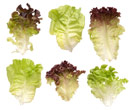
For a continual harvest, sow lettuce seeds every 2-3 weeks.
Lollo Rossa
Amish Deer Tongue
Romaine Forellenschluss varieties
SPINACH
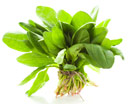
Grow this cool season crop in spring, fall, and even into winter in temperate climates.
Giant Noble
EGGPLANTS

Most varieties, and there are so many to choose from, do well in containers.
Listada di Gandia
TOMATOES

Plant in larger containers and choose compact, determinate varieties.
Minibel (smallest)
Abu Rawan (heat tolerant)
Sub-Arctic Plenty (tolerates cool conditions)
PEPPERS

Hot or mild, peppers are a treasure to grow.
Red and Yellow Marconi (very productive)
King of the North
Anaheim (great for rellenos)
HERBS
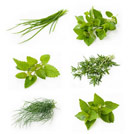
Most culinary herbs do fantastic in containers. Basil, parsley, and cilantro are easily started from seed. Hardier herbs like thyme, sage and rosemary tend to be slow growers and are best bought as starts.
Sweet Genovese Basil
Thai Siam Queen Basil
Cilantro
Common Thyme
Broadleaf Sage
Rosemary
Container gardening does take time and attention but the rewards are sweet! Friends will surely comment on the bounty growing on your back stoop. You’ll relish in the ease of stepping outside to pick basil and tomatoes for your fresh caprese salad. Best of all, you just may discover the joy and serenity that the simple acts of digging in soil and watching a garden grow can bring to your mind, body and soul.
Written by Alexa Croft



Pingback: Gluten Free Quick & Easy Caprese Tarts Recipe | Simply Gluten Free
Pingback: Szechuan Chicken Noodle Salad | Simply Gluten Free
Pingback: Gluten Free Southern Style Bean & Kale Soup | Simply Gluten Free
Pingback: Gluten Free End of Summer Casserole Recipe | Simply Gluten Free
Pingback: Gluten Free Dairy Free Zucchini Gratin Recipe | Simply Gluten Free
Pingback: Gluten Free Scalloped Tomatoes Recipe | Simply Gluten Free
Pingback: Simple Fruit Herb Jam | Recipe | Simply Gluten Free